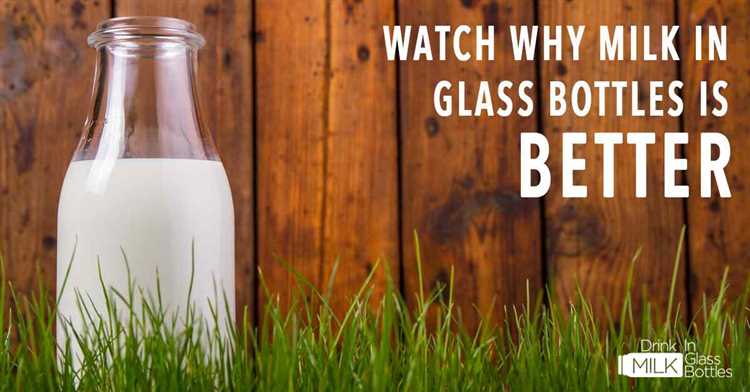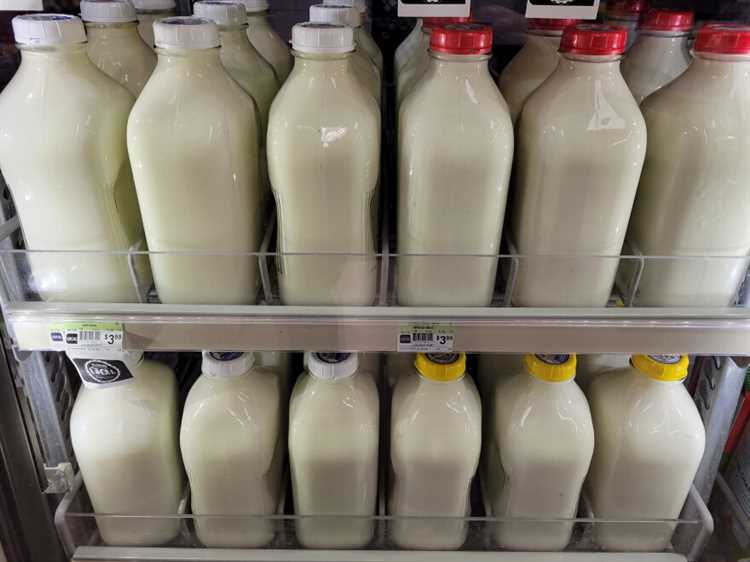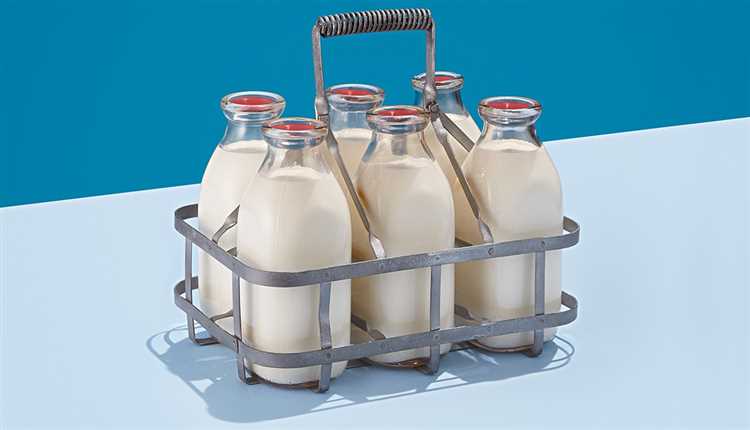
When you go to the grocery store, you’re faced with a multitude of choices when it comes to buying milk. Should you go for the carton, the plastic jug, or the glass bottle? While each option has its own merits, there are several key advantages to choosing milk in glass bottles.
First and foremost, glass bottles are environmentally friendly. Unlike plastic jugs or cartons, glass bottles can be reused over and over again. This reduces the amount of waste that ends up in landfills and helps minimize the overall impact on the environment. Plus, glass is a natural and recyclable material, making it an excellent choice for eco-conscious consumers.
Secondly, milk in glass bottles tastes better. Glass is a non-porous material, which means it doesn’t absorb any odors or flavors from its surroundings. This helps to preserve the freshness and natural taste of milk, ensuring that every sip is as delicious as the first. Plastic jugs, on the other hand, can sometimes give milk a plastic-like taste, which can be off-putting to some people.
Furthermore, glass bottles provide better protection for milk. The thick walls of glass bottles offer superior insulation, keeping the milk colder for longer periods of time. This is especially important during hot summer months or if you live in a warm climate. Additionally, glass bottles are less prone to breakage during transportation, ensuring that the milk stays safe and intact until it reaches your refrigerator.
Lastly, milk in glass bottles adds a touch of nostalgia. There’s something charming and old-fashioned about pouring milk from a glass bottle into your morning cereal or coffee. It harkens back to a time when milk was delivered fresh to your doorstep, and it adds a sense of tradition and connection to the past.
Overall, choosing milk in glass bottles is not only a sustainable option, but it also offers a better taste, improved protection, and a sense of nostalgia. So next time you’re at the grocery store, consider reaching for a glass bottle and enjoy the many advantages it has to offer.
- The Benefits of Milk in Glass Bottles
- 1. Sustainability
- 2. Preservation of Taste and Quality
- 3. Aesthetics
- Environmental Sustainability
- Reduced Carbon Emissions
- Promotion of Local Agriculture
- Preserving Freshness and Taste
- Non-toxic and Chemical-free
- The Importance of Chemical-free Packaging
- Milk Safety and Quality Assurance
- Aesthetic Appeal
- Recyclability and Reusability
- Supporting Local Dairy Farmers
- 1. Direct Financial Support
- 2. Reduced Production Costs
- 3. Strengthened Local Economy
- Q&A:
- Why should I choose milk in glass bottles instead of plastic bottles?
- Is milk in glass bottles more expensive than milk in plastic bottles?
- Can I reuse glass milk bottles?
- Does milk in glass bottles have a longer shelf life?
- Are there any drawbacks to choosing milk in glass bottles?
- Is milk in glass bottles better for the environment?
The Benefits of Milk in Glass Bottles
Milk in glass bottles offers numerous benefits compared to other packaging options. Here are some of the advantages:
1. Sustainability
Glass bottles are a more sustainable choice for milk packaging. Unlike plastic containers, glass bottles are 100% recyclable and can be reused multiple times. This reduces waste and helps to minimize the environmental impact. Additionally, glass is made from abundant natural materials such as sand and is not derived from fossil fuels like plastic.
2. Preservation of Taste and Quality
Glass bottles provide better preservation for milk’s taste and quality. Unlike plastic packaging, glass is impermeable and doesn’t allow any external odors or flavors to seep into the milk. This helps to maintain the freshness and original taste, ensuring a superior drinking experience. Glass also prevents the exposure to potentially harmful substances found in some plastic containers.
Furthermore, glass is an inert material that doesn’t react chemically with milk or any other beverages. This means that the milk’s nutritional properties and vitamins remain intact without any alterations caused by the packaging material.
3. Aesthetics
Milk in glass bottles also adds an aesthetic value to the overall presentation. Glass is transparent, allowing consumers to see the product they are purchasing. This transparency enhances trust and confidence in the quality and freshness of the milk. Moreover, glass bottles have a classic and nostalgic appeal that is often associated with homemade or farm-fresh products.
Additionally, glass bottles can be reused or repurposed in various ways, giving them a longer life span and adding to their charm as a decorative household item.
In conclusion, opting for milk in glass bottles is a superior choice in terms of sustainability, preservation of taste and quality, and aesthetic appeal. By choosing glass over plastic, consumers can enjoy the benefits of a more environmentally friendly and enjoyable milk-drinking experience.
Environmental Sustainability
Milk in glass bottles offers several significant advantages in terms of environmental sustainability compared to other forms of packaging. Firstly, glass bottles are reusable and can be returned to the dairy for sterilization and refill. This significantly reduces waste and promotes a circular economy.
Furthermore, glass is a highly recyclable material. It can be melted down and reused indefinitely without losing its quality. This means that by choosing milk in glass bottles, consumers are contributing to the reduction of landfill waste and the conservation of natural resources.
In addition, the production of glass bottles has lower environmental impacts compared to other types of packaging materials. Glass is made from abundant natural resources such as sand, soda ash, and limestone. The manufacturing process for glass is energy-intensive, but advancements in technology have made it more energy-efficient over the years.
Reduced Carbon Emissions
Milk in glass bottles also helps in the reduction of carbon emissions. Glass has a higher melting point compared to other materials like plastic, which allows it to be sterilized at higher temperatures. This means that the milk can be treated to eliminate harmful bacteria without the need for additives or preservatives. As a result, the transportation and refrigeration requirements for milk in glass bottles are lower, leading to fewer greenhouse gas emissions.
Promotion of Local Agriculture
Choosing milk in glass bottles also supports local agriculture. Many small-scale dairy farmers prefer to use glass bottles as it allows them to have a direct relationship with consumers. By purchasing milk in glass bottles, consumers can have a closer connection to the source of their food and support local farmers, which contributes to a more sustainable and resilient local food system.
In conclusion, milk in glass bottles offers a more environmentally sustainable option compared to other forms of packaging. The reusable nature of glass bottles, their recyclability, and lower carbon emissions make them a better choice for those concerned about the environment. Additionally, choosing milk in glass bottles supports local agriculture and promotes a more sustainable and resilient food system.
Preserving Freshness and Taste
One of the biggest advantages of milk in glass bottles is that it can help preserve the freshness and taste of the milk. Unlike plastic bottles, glass bottles are impermeable and do not absorb or release any substances that can affect the milk’s flavor or quality. This means that the milk will stay fresher for longer and retain its natural taste.
Glass bottles also provide a better barrier against external odors and contaminants. The airtight seal of the glass bottle prevents any unwanted smells or particles from getting into the milk, ensuring that it remains pure and untainted.
Furthermore, glass does not contain any harmful chemicals like BPA (bisphenol A), which is commonly found in plastic containers. BPA has been linked to various health issues, and its absence in glass bottles ensures that the milk is free from any potential harm.
The opacity of the glass bottle is another factor that helps preserve the milk’s freshness. Light exposure can cause the breakdown of vitamins and proteins in milk, leading to a loss of nutritional value and taste. Glass bottles protect the milk from light, maintaining its nutrient content and overall quality.
In addition to preserving freshness and taste, glass bottles are environmentally friendly. They can be reused and recycled, reducing waste and minimizing the impact on the environment. By choosing milk in glass bottles, consumers can contribute to sustainable practices and promote a healthier planet.
Non-toxic and Chemical-free
One of the key advantages of milk in glass bottles is that it is non-toxic and chemical-free. Glass is an inert material, meaning it does not release any harmful chemicals or toxins into the milk. This is particularly important when it comes to storing and consuming dairy products, as some plastics used in packaging can leach chemicals into the food or drink they are in contact with.
Many plastic containers, such as those made from polycarbonate or PVC, contain chemicals like BPA (bisphenol A) and phthalates. These chemicals have been linked to various health issues, including hormonal disruptions, reproductive problems, and certain types of cancer. By choosing milk in glass bottles, you can eliminate this potential source of chemical exposure.
In addition, glass is a non-porous material, which means it does not absorb any odors or flavors from the milk. This ensures that the taste and quality of the milk are not compromised. Unlike plastic containers, glass bottles do not retain any residual smells or tastes, allowing you to fully enjoy the natural flavor of the milk.
The Importance of Chemical-free Packaging

Opting for milk in glass bottles is not only beneficial for your health, but also for the environment. Glass is a recyclable material that can be recycled indefinitely without losing its quality. By choosing products packaged in glass, you can help reduce the amount of plastic waste that ends up in landfills or pollutes our oceans.
Milk Safety and Quality Assurance
When milk is packaged in glass bottles, it undergoes a stringent quality control process to ensure that it meets the highest standards of safety and quality. The glass bottles provide a reliable and durable packaging solution that protects the milk from external contamination and maintains its freshness.
In conclusion, milk in glass bottles offers the advantage of being non-toxic and chemical-free. It eliminates the risk of chemical leaching from plastic containers and provides a safe and environmentally friendly packaging option. So, the next time you purchase milk, consider choosing it in a glass bottle for your own well-being and the health of the planet.
Aesthetic Appeal

One of the advantages of milk in glass bottles is its aesthetic appeal. Glass bottles have a classic and timeless look that can add a touch of elegance to any kitchen or dining table. The clarity and transparency of the glass allow the consumer to see the milk inside, giving it a fresh and inviting appearance.
Furthermore, the use of glass bottles for milk creates a sense of nostalgia for a bygone era when milk delivery in glass bottles was a common sight. This vintage feel can evoke feelings of warmth and comfort, reminding people of simpler times.
In addition to its visual appeal, glass bottles are also eco-friendly. They can be reused and recycled, reducing waste and minimizing the environmental impact. By choosing milk in glass bottles, consumers can contribute to a more sustainable future.
Overall, the aesthetic appeal of milk in glass bottles is undeniable. It can enhance the overall experience of consuming milk and add a touch of charm to any setting.
Recyclability and Reusability
One of the main advantages of milk in glass bottles is its recyclability and reusability. Glass is 100% recyclable and can be endlessly recycled without losing its quality or purity. When glass bottles are recycled, they are broken down and melted to create new glass products, reducing the demand for raw materials and saving energy.
Furthermore, glass bottles can also be reused multiple times before being recycled. Unlike plastic bottles which can degrade over time and leak harmful chemicals into the milk, glass bottles remain sturdy and can be thoroughly cleaned and sterilized for safe reuse. This not only reduces waste but also helps to minimize the carbon footprint associated with the production and transportation of new bottles.
In addition, the use of glass bottles promotes a circular economy by encouraging consumers to return their empty bottles for refill instead of disposing of them. This not only saves resources but also reduces the amount of waste that ends up in landfills or pollutes our oceans.
In conclusion, milk in glass bottles offers significant advantages in terms of recyclability and reusability. By choosing milk in glass bottles, consumers can contribute to a more sustainable and environmentally friendly packaging option.
Supporting Local Dairy Farmers
Choosing milk in glass bottles not only benefits the environment, but it also supports local dairy farmers. By purchasing milk in glass bottles, consumers can contribute to the sustainability and prosperity of their local farming communities. Here are a few ways that opting for milk in glass bottles can support local dairy farmers:
1. Direct Financial Support
When consumers buy milk in glass bottles directly from local dairy farmers, it allows them to receive a fair price for their products. This direct financial support helps sustain their businesses, allowing them to continue producing high-quality dairy. By supporting local dairy farmers, consumers play an instrumental role in ensuring the livelihoods of these hardworking individuals.
2. Reduced Production Costs
Milk in glass bottles typically involves a shorter supply chain, reducing transportation and packaging costs. As a result, dairy farmers can save money on production, allowing them to invest more in the quality of their milk and animal welfare. By choosing milk in glass bottles, consumers indirectly contribute to reduced production costs for local dairy farmers.
3. Strengthened Local Economy
Purchasing milk in glass bottles from local farmers also strengthens the local economy. When consumers support local dairy farmers, they contribute to the overall economic development of their community. This support helps sustain jobs within the farming industry and boosts the local economy by keeping money within the community.
| Benefits | Explanation |
|---|---|
| Direct financial support | Buyers pay fair prices, sustaining dairy farmers’ businesses. |
| Reduced production costs | Shorter supply chain reduces transportation and packaging expenses. |
| Strengthened local economy | Supporting local farmers contributes to economic development. |
By choosing milk in glass bottles, consumers can actively participate in supporting local dairy farmers, ultimately fostering a more sustainable and vibrant farming community.
Q&A:
Why should I choose milk in glass bottles instead of plastic bottles?
There are several advantages of choosing milk in glass bottles over plastic bottles. Firstly, glass is a much safer and healthier option as it is BPA-free and does not contain harmful chemicals that can leach into the milk. Additionally, glass is environmentally friendly as it is easily recyclable and can be reused multiple times. Glass bottles also provide a better taste and quality of milk, as they do not alter the flavor or absorb any odors like plastic bottles do.
Is milk in glass bottles more expensive than milk in plastic bottles?
While milk in glass bottles may be slightly more expensive than milk in plastic bottles, the price difference is usually minimal. The overall cost of milk in glass bottles is often justified by the higher quality, better taste, and the environmental benefits it offers. Additionally, some people are willing to pay a slightly higher price for milk in glass bottles because they believe it is a healthier and safer option for them and their families.
Can I reuse glass milk bottles?
Absolutely! Glass milk bottles are designed to be reused. After finishing the milk, you can simply rinse out the bottle and return it to the store for a refill. This helps reduce waste and is an eco-friendly option. Many stores and dairies encourage the reuse of glass bottles by offering a discounted price for refills. Just make sure to handle the glass bottles with care to avoid any accidents or breakages.
Does milk in glass bottles have a longer shelf life?
Milk in glass bottles does not necessarily have a longer shelf life compared to milk in plastic bottles. The shelf life of milk primarily depends on the processing and pasteurization methods used, as well as the storage conditions. However, glass bottles can help preserve the freshness and taste of milk better than plastic bottles. The non-porous surface of glass prevents any air or moisture from entering the bottle, which helps keep the milk fresher for longer.
Are there any drawbacks to choosing milk in glass bottles?
While there are numerous advantages to choosing milk in glass bottles, there are a few potential drawbacks to consider. Glass bottles are heavier and more fragile than plastic bottles, which can make them more difficult to handle and transport. Glass bottles also require more energy and resources to produce and recycle. Additionally, not all stores offer milk in glass bottles, so availability may be limited depending on where you live. Despite these drawbacks, many people still prefer milk in glass bottles due to its numerous benefits.
Is milk in glass bottles better for the environment?
Yes, milk in glass bottles is considered better for the environment compared to other packaging options like plastic or cartons. Glass is a fully recyclable material that can be reused indefinitely without losing its quality. It also doesn’t pose a threat to marine life or contribute to plastic pollution in oceans.